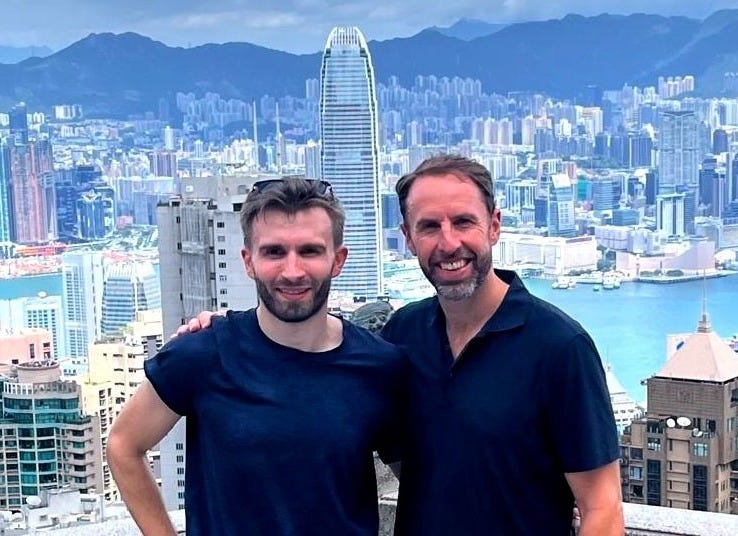China, Tariffs & Penalties
"One system, one country", defending protectionism, and Sir Gareth Southgate.
Otium Den recap:
China gets its way
I was back in Hong Kong last week. It felt less tumultuous as a visitor than as a resident. A couple of months after moving there in 2019, protests started against a proposed extradition bill. Demonstrators feared Beijing would use it to arrest political dissidents protected under common law in Hong Kong. The bill’s eventual withdrawal was a pyrrhic victory. Self-imposed Covid isolation in 2020 was the guise for the far more onerous National Security Law. That guaranteed extradition rights alongside sweeping new sedition measures that criminalised such protests.
Like most expats, I was more annoyed by Covid rules than political oppression. Limiting gatherings to two people made drinks as difficult as demonstrating. Anyone daring to travel abroad faced three weeks of hotel quarantine on return. And those unlucky enough to fail one of the government’s random tests faced a less luxurious 21 day stay at Penny Bay, a hastily built Covid camp on Lantau island. Now, travelling into town on the airport express, I see Penny Bay bulldozed for airport expansion works. What once symbolised the city’s retreat into a hermit kingdom is now part of attempts to re-establish Hong Kong’s credentials as Asia’s World City.
I’m told I’m amongst the third of foreigners that left the territory during Covid. The popular expat hunting grounds, the bars of central Soho, are certainly emptier. But that’s not to China’s regret. The Financial Times describes Hong Kong’s new role as less of a window for foreigners into China and more of a gateway for Chinese businesses to the rest of the world.
I’m no sinologist but I can hear the shift. Cantonese’s distinct tonal rhythms are increasingly drowned out by the “sh”-heavy sounds of the mainland’s mandarin dialect. A sign of the city’s eroding identity for people like my wife’s parents, proud Hong Kongers who left for the UK under the BNO scheme. But China banked on weathering the moral outrage, and the wager has paid off. Business didn’t flee and the skyscrapers branded with big multinational names are busy as ever.
We thought Hong Kong was the frog in the boiling pot. Small changes compound until a new reality feels inevitable. But China tired of that gradual approach, where every step is contested. Instead, it picked an opportune moment to go all-in. In Hong Kong, that has meant people recalibrating around what remains possible - chiefly, making money - rather than fixating on what has been taken away.
If tariffs are so bad, how did these countries get so rich?
I was in town for an investor conference. In the city’s new political climate, it’s unusual for such events to open with a steadfast defence of US policies. Yet Hungarian-American economist Zoltan Pozsar did so when talking about Trump’s economic reforms. Pozsar gave the bull thesis for America’s strategy:
Tariffs: Revenues will be meaningful. They’re likely to beat Treasury Secretary Scott Bessent’s own $300 billion estimate. And the costs will be re-distributed globally. Big retailers will pass them on to consumers in other markets, rather than being borne solely by US buyers. The effect on US inflation will only be incremental.
Speaking to a predominantly Asian audience, Pozsar noted that tariffs were central to the rapid post-WW2 rise of its economies.
If tariffs are so bad, how did these countries get so rich? he asked.
Interest rates: Aggressive cuts are coming. Those will ease concerns over the US deficit. Servicing costs currently represent about 17% of federal spending and that will fall substantially once rates come down.
Stablecoins: Digital tokens backed by real US dollars or government bonds. The GENIUS Act, signed in July, creates a federal regulatory framework for them. If central banks stop buying US Treasuries, other investors will make up the shortfall through stablecoins. Thus ensuring continued dollar hegemony. As Pozsar says, “if the kings don’t buy treasuries, the plebs will.”
The case for optimism, Pozsar argues, is obscured by a partisan press. Commentators cast the Fed as the good guy “centrist dad”. But the US central bank is not a guardian of sensible independence. It has its own agenda. Pozsar cites former Fed president Bill Dudley’s 2019 Bloomberg article, arguing the Fed shouldn’t enable Trump’s economic policies. Nor is its recent record impressive. It argued inflation was only transitory during Covid and engineered generational inequality through repeated bouts of quantitative easing.
For Pozsar, the crux of the problem is that central banks are anchored in the present. It doesn’t work with the structural thesis of the administration in power. Bessent believes AI will unleash a supply glut that is inherently deflationary. So, the Fed should be forward thinking in cutting rates now. Pozsar looked back fondly to former governor Alan Greenspan who tolerated strong growth and tight labour markets in the 1990s because technology gains kept inflation in check.
The British context
How do democracies enact change if unelected levers of power work against them? That’s the question Liz Truss has consistently pressed since she was dumped as Prime Minister after just six weeks. On Bloomberg’s Odd Lots podcast, she argued the Treasury should play a much stronger role in setting the Bank of England’s mandate.
Could the Bank have better prepared for a seismic shock to the gilt market? Just six months after her downfall, it recommended that The Pensions Regulator set minimum collateral cushions for pension funds. Had the advice come earlier, the gilt-selling spiral could have been avoided. Truss’ reforms would have had a fighting chance. Was the failure her poor communication? Or are central banks simply unwilling partners when it comes to enabling change?
Southgate’s penalty lessons
Speaking of great English leaders, the conference’s headline star was former England manager Sir Gareth Southgate. I can’t claim him as a Brexiteer but he sees the importance of taking back control. When he missed that crucial penalty at Euro 96, shootouts were seen as a lottery. Players felt hostage to randomness and fortune. It didn’t help that Southgate had to walk an extra 20 yards to collect the ball, which the German goalkeeper had booted away. As England manager, one of his small changes was getting England’s keeper Jordan Pickford to hand the ball to teammates instead. Seeing a familiar face helped players gain control over the process. England had lost five consecutive penalty shootouts before Southgate took over. Under him, they won three out of four. He arrested the fans and players’ perception of inevitable decline as penalties approached.
Southgate takes the parallels between the football team and the nation seriously. He took over with the side at its lowest ebb. Sam Allardyce had resigned after 67 days in a corruption scandal, and the team had been humiliated by Iceland at the Euros. Two of Southgate’s lessons feel particularly relevant beyond football. First, focus on the small things. Commentators often dismiss minor fixes as trivial, but you have to start somewhere. Second, have a sunnier disposition. Too much political discourse is cranky and joyless. England has its problems, but it is still a wonderful country. Perhaps starting from that basis is a better way to unify around the change needed.




